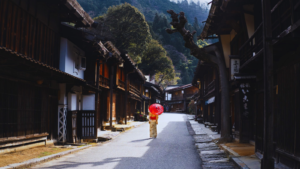(Half ) A Day in the Life of a Volunteer English Teacher
I often wait for the little bird to start chirping. She usually lets out her first trills around 4:30 a.m., so I am allowed to get up (I draw the line at getting out of bed before 4 a.m., which still happens at times, when I wake up to thoughts whizzing around my head about what I want to do on that day). Mind you, I go to bed early (crazy early, say my Ecuadorian and Greek friends), so I do get the 6-7 hours I need to function.
My best time of the day is morning time. Europe is 6-7 hours ahead of where I am in Ecuador, South America, so it’s coming up to lunchtime in the countries where I have many of my contacts, for example, Athens. I wanted to go there last summer to help with the Syrian refugees, by offering to teach Survival English. For health reasons, I couldn’t fly, but I have been in touch with the small-framed but formidable Sumita Shah ever since. The closed group she and her friends set up about a year ago, numbers eleven and a half thousand members and the work they do is essential, because in my opinion, the international organizations involved are not doing their best. And that’s an understatement.
I look at the time. It’s 5:15 a.m. Suddenly, a message flashes up on the screen telling me it is International Volunteers Day! The information on how this fact could be exploited in the classroom is provided neatly by the Global Issues Special Interest Group of IATEFL – my professional community. I do a lot of things, but volunteering is such an important part of my life that I have decided to focus on it exclusively for this article.
I see a message from Greece, from someone working for a small NGO that provides support for unaccompanied minors and vulnerable families. The day before I wrote to one of the directors saying that perhaps there should be a bit more transparency about the use of donations that had been sent there from our end. I also gave them what I hope was helpful advice on what they could do to keep the donors happy and raise their profile. This is important, because Heart ELT is campaigning on behalf of the very same NGO and the fundraisers are keen that the money goes to where it’s needed most, which is often education in the widest sense. So now I’m given a rundown of what the organization has been doing lately, which includes helping refugee children register for school and following them through the process from their first doctor’s appointment to liaising with the teachers of the Greek school.
A little later in the morning, I send a short message of encouragement to my volunteering partner, Rick Smith, who is working with disadvantaged children in a small village near Cuenca. This is where, in Rick’s words, “another angel” is working: Rocío Illescas, who, with her sister, Janeth have been running a day centre in a small school built on land that their mother, Lucy, had left to them. Cuenca’s growing expat community has been involved in sending volunteers to help with English and computer skills.
I only started going there a couple of weeks ago (I have my own project teaching English for free to five underprivileged university students, who have been awarded scholarships, but owing to their circumstances appear to be struggling in their first year), so I thought it might be a good idea to look for other volunteers who have enough Spanish to explain English grammar. A young Ecuadorian lady (Rule No 1 in volunteering: identify, train up and mentor a local counterpart, who can carry on when you are gone) and a retired teacher from the US with advanced Spanish skills responded, and I set up their first visit for this week.
Then it’s a message from another Rick, saying that the solar lamps will arrive at a designated place in the US by Wednesday, from where a kind soul will bring them to Cuenca before Christmas. The solar lamp project is a different story; suffice to say that while I worked as a volunteer English teacher in a small Achuar community in the Amazonian jungle, Rick Crook told me about these small-sized lanterns that run on solar power. In the past two years, we have managed to get about a 100 pieces into the rain forest, but since the organization I worked with in the jungle is not registered as a charity, each time something was shipped, we were dreading that the consignment might be deemed a “commercial quantity” and customs duty (steep) would need to be paid. So far we have been lucky, and the ten lamps that are arriving soon will be taken to another isolated Achuar community and sold at roughly half the cost to us (Rule No 1 in donating: If you give something for absolutely free, it has no value whatsoever).
Time for a cup of coffee. By the time I sit back, there’s a message from Proyecto Samán, which is run in the north of Ecuador near Canoa. The earthquake that rocked Ecuador in April 2016 hit this area the hardest, and Sara Coppler, who had moved to Cuenca several years before, left town to help the families who survived the disaster. Sara has more than 20 years of international development and disaster response experience, and by now has set up an impeccably functioning, sustainable community. A local landowner has offered land for families to buy and build eco-friendly homes and manage small farms.
It’s mid-morning. When I click on the FB messages, I can see that the head of the jungle school, Inés, has sent me photos of their IT room at Colegio Tuna. Two years ago, the Ministry for Rural Development installed satellite Internet connection for students and staff (as well as the nearby communities), a must for a high school that specializes in eco-tourism. A dozen Toshiba laptops were also supplied with proper office furniture and a huge printer. However, the climate in the jungle is harsh: dust and humidity eat away at everything. Printing paper got wet and caused jams in the expensive machine, the cartridges ran out, the Chinese batteries inside the laptops died and the router stopped working, too. Students’ IT classes were cancelled or given without computer access using sketches on the whiteboard.
The price of new batteries is prohibitive in Ecuador, so we had to figure out if we could buy them cheaper in Europe. After having a sample sent back to see if it worked, I brought back ten more from London. Once again, I dreaded that the consignment would draw undue attention from the Aduana (Customs Authority). However, I got away with it and sent the lot down to Puyo (closest to the small town from where you fly into the jungle). The high school’s ex-deputy head, an IT specialist, bought a new router (funded by the teaching staff), replaced the batteries and, miracle of miracles, each and every laptop is working and proper IT classes are being delivered again.
I quickly forward the images to the founder, and now a trustee, of the UK educational charity, The Condor Trust that supports students from very low income families to go to secondary school and then on to university in Ecuador.
At 11:30 I send a quick “bravo” message to the volunteers in the Athens group and then one to my daughter: Happy International Volunteer Day! She gives me the thumbs up. Maybe soon it will be her turn to write up her volunteering experience in Crete, Haiti and Borneo as well as the Kichwa villages in Ecuador.
I really must go. It’s 12:00 noon and I’ve got loads to do. However, as the saying goes, “If you love what you do, you’ll never have to work.”




